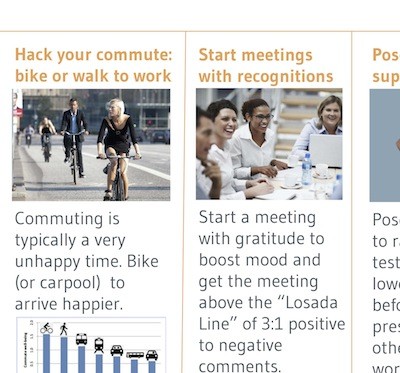
Tips from the leading edge of positive psychology
I’m excited to share some of the amazing things I learned at the International Positive Psychology Association World Congress in Los Angeles. I presented a poster titled “Hacking Into Happiness: Habits for the Workplace.” Please click the preview image on the left to request a copy, and stay tuned for my upcoming book with a similar theme.
I felt so fortunate to be meeting and listening to some of the giants of positive psychology–the study of human flourishing. It was a dream come true for this science-of-happiness geek!
Some of the most important ideas include the following. With so much great science, I’ll only be able to very briefly summarize a few key points. For more information, I encourage you to read more by these great scholars, or contact me.
I tweeted some of these ideas from the conference. If you want to get bite-size tips on a regular basis, please follow me on Twitter. Please note that these are not quotes, but my own words summarizing what others said. Also note that some of the research and people here were mentioned by others at the conference.
- The more someone thinks about future or past, the more meaning and less happiness they typically have. –Roy Baumeister
- Positive emotions broaden awareness and build resources. They open and nurture our minds. They help us focus on others. –Barbara Frederickson
- Smiles grab attention more than any other facial expression–even anger. – D. Vaughan Becker.
- Eye contact causes facial mimicry, which builds neural synchrony. –Barbara Frederickson
- The more positive emotion you feel, the more connected you feel to others and the better your heart health. – Barbara Frederickson
- When people recover & refresh from work stress, they are more energetic, helpful, and perform better. –Sabine Sonnentag
- The refreshing effects of vacation fade in less than a month, making daily recovery important. Exercise & socializing work well. –Sabine Sonnentag
- Those who psychologically detach from work in off hours are less exhausted, happier and more satisfied with life. –Sabine Sonnentag
- In order to stay happy, highly engaged employees need psychological detachment from work more than the average worker. –Sabine Sonnentag
- Virtuous, positive practices in organizations positively affect turnover, customer satisfaction, & profitability. – Kim Cameron
- Daily hassles diminish well-being more than major life events. Self affirmations based on values can help our well-being & stress response. – Allen D. Kanner
- The future of humanity increasingly relies on our choices. –Mihaly Czikszentmihalyi
- Those who practice gratitude end up getting more physical exercise. –Robert A Emmons
Overall, the main theme that emerged for me is that happiness can be part of a virtuous cycle. That is, happiness results in our brains working better. It leads to us connecting better to other people. It results in us taking better care of our bodies. All of which results in us being happier. I’ll take that virtuous cycle any day!
What do you think? What’s the most interesting finding to you? What would you like these brilliant scientists to study next? Please comment below or on the Happy Brain Science Facebook page.